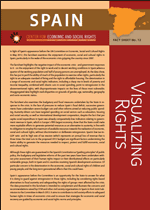Published on Wed, 2012-05-16 09:26
The danger of policy measures designed to socialize the costs of the crisis have become painfully apparent in Spain, where the impacts of successive austerity budgets have resulted in deteriorating outcomes across a broad spectrum of human rights indicators, warned the Center for Economic and Social Rights (CESR) in a parallel report coordinated with 18 civil society groups for the UN Committee on Economic, Social and Cultural Rights’ 48th session, held earlier this month in Geneva. |
Published on Mon, 2012-05-14 10:01
“The Internet should be governed on the principles of human liberty, equality and fraternity,” remarked six relevant civil society organizations on a statement addressed to the United Nations Commission on Science and Technology for Development (UN CSTD). The UN body will hold this Friday in Geneva a meeting on Enhanced Cooperation on Public Policy Issues Pertaining to the Internet. |
Published on Thu, 2012-05-10 14:07
Government representatives have failed last week to reach consensus on “The future we want,” the global plan of action to be adopted next month by the UN Conference on Sustainable Development (Rio2012). The second round of informal negotiations on the draft outcome document, held at the United Nations headquarters in New York, saw intense debates and divides among delegates, who agreed to meet again for other five days of deliberations to bridge differences. |
Published on Thu, 2012-05-10 14:04
With the Rio2012 Summit approaching, a preparatory meeting in New York last week discussed how to strengthen or create various institutions to deal with the three dimensions of sustainable development, wrote Martin Khor, executive director of South Centre, in his most recent column for The Star, one of the leading Malaysian newspapers, and the South North Development Monitor (SUNS). |
Published on Thu, 2012-05-10 14:03
The International Federation for Human Rights (FIDH) stated this week its grave concern about the arrest of its deputy secretary general, Nabeel Rajab, and the continuing targeting of activists in Bahrain. On May 5th, Rajab, president of the Bahrain Center for Human Rights (BCHR), was arrested after arriving at Manama airport from Lebanon and is currently detained in Al Hawra police station. |
SUSCRIBE TO OUR NEWSLETTER







